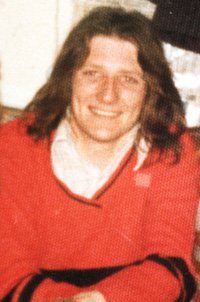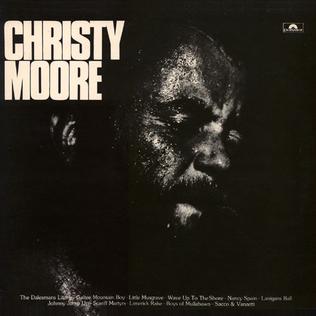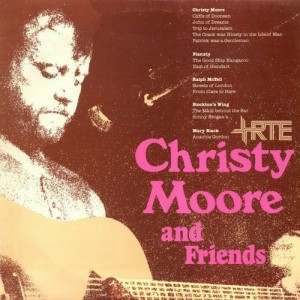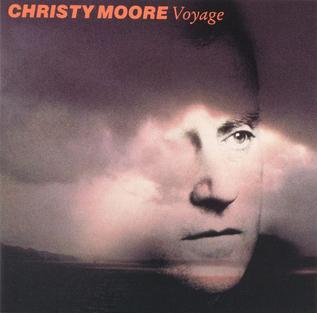
"The Wreck of the Edmund Fitzgerald" is a 1976 hit song written, composed and performed by Canadian singer-songwriter Gordon Lightfoot to commemorate the sinking of the bulk carrier SS Edmund Fitzgerald on Lake Superior on November 10, 1975. Lightfoot drew his inspiration from Newsweek's article on the event, "The Cruelest Month", which it published in its November 24, 1975, issue. Lightfoot considers this song to be his finest work.
In the music of Ireland, Irish rebel songs refer to folk songs which are primarily about the various rebellions against English Crown rule. Songs about prior rebellions are a popular topic of choice among musicians which supported Irish nationalism and republicanism. In the 20th and 21st centuries, Irish rebel songs focus on physical force Irish republicanism in the context of the Troubles in Northern Ireland.

Christopher Andrew "Christy" Moore is an Irish folk singer, songwriter and guitarist. He is one of the founding members of Planxty and Moving Hearts. His first album, Paddy on the Road was recorded with Dominic Behan in 1969. In 2007, he was named as Ireland's greatest living musician in RTÉ's People of the Year Awards.

Ride On is an album by Irish folk singer Christy Moore, released in 1984. Its title track remains one of his most popular songs. A number of songs relate the actions of those involved in political struggles, or those affected by those struggles; such as "Viva la Quinte Brigada" which is concerned with the Irish contingent amongst the International Brigade in the Spanish Civil War; or "El Salvador" dealing with the civil war in that country in the 1980s. Other songs deal with Irish history – "The City of Chicago", about emigration to America during the Irish famines of the late 1840s; "Back Home in Derry" written by Bobby Sands about the transportation to Australia of convicts; and "Lisdoonvarna" celebrating a music festival that took place annually in that town until the early 1980s.
Philip Coulter is an Irish musician, songwriter and record producer from Derry, Northern Ireland. He was awarded the Gold Badge from the British Academy of Songwriters, Composers and Authors in October 2009.
Back Home in Derry is an Irish rebel song written by Bobby Sands while imprisoned in HM Maze.
The People's Own MP is an Irish rebel song about Bobby Sands, one of the Irish hunger strikers.
Between 1 March 1976 and 3 October 1981, Irish republican prisoners in HM Prison Maze carried out a variety of protests against the withdrawal of Special Category Status for prisoners convicted of proscribed "terrorism" offences. These protests culminated in the 1981 Irish hunger strike in which ten prisoners died.

Ordinary Man is the tenth studio album by Irish folk artist, Christy Moore. It features songs like "Ordinary Man", "St. Brendan's Voyage" and "Another Song is Born". The album featured songs by Peter Hames, Johnny Mulhearn, Hugh McDonald, Colm Gallagher and Floyd Red Crow Westerman; as well as some backing vocals by Enya on "Quiet Desperation", "Sweet Music Roll On" and "The Diamondtina [sic] Drover" and some fine uilleann pipes work by Liam O'Flynn.

Live at the Point is a live album by Irish folk singer Christy Moore, released in 1994. The album was recorded at the Point Theatre in Dublin over a course of a number of concerts in 1994.

Robert Gerard Sands was a member of the Provisional Irish Republican Army (IRA) who died on hunger strike while imprisoned at HM Prison Maze in Northern Ireland. Sands helped to plan the 1976 bombing of the Balmoral Furniture Company in Dunmurry, which was followed by a gun battle with the Royal Ulster Constabulary. Sands was arrested while trying to escape and sentenced to 14 years for firearms possession.

Christy Moore is the fourth solo album by Irish folk musician Christy Moore, released in 1976.

Christy Moore and Friends is an album produced by RTÉ and Christy Moore, which contained recordings by various Irish musicians, namely Stockton's Wing, Mary Black and Christy's former band Planxty.

The Time Has Come is an Irish folk music album by Christy Moore. The album also features instrumental work by Irish musician Dónal Lunny.

Unfinished Revolution is a 1987 Irish folk music album by Christy Moore. The album was released the same year as the Remembrance Day bombing in Enniskillen, an event Moore described as changing his viewpoint on Irish Republicanism. The album title refers to Moore's long-time support of Irish unification.

Voyage is an Irish folk music album by Christy Moore. The album features songs of a political nature, however unlike Moore's past releases, the subjects aren't limited to Ireland specific issues. Sinéad O'Connor sings "Middle of the Island" with Moore.

Live at Vicar Street is a live album released by Irish folk singer/songwriter Christy Moore in 2002.
Where I Come From is a 3 disc album by Irish folk singer Christy Moore, released in 2013 by Columbia Records. The album features a number of new compositions as well as re-recordings of past songs.
"If They Come in the Morning" is the original title of the song better known as "No Time For Love". It was recorded by Moving Hearts for their debut album in 1981. It also has been recorded in 1986 by Christy Moore on his The Spirit of Freedom album. It was written by American singer/songwriter Jack Warshaw in 1976. The title was borrowed from the book of the same title by Angela Davis, rephrasing the closing line of James Baldwin's letter to her of November 19, 1970: "...if they take you in the morning, they will be coming for us that night". From its first line the song attacks unjust law in the forms of "apartheid, internment, conscription, partition and silence..." with references to places prominent in the news at the time: Boston, Chicago, Saigon, Santiago (Chile), Cape Town and Belfast. Warshaw had visited Belfast on a research project and knew fellow Belfast/Derry songwriters The People of No Property whose recording was to be the source of Moore's version. To Moore and Irish opposition to partition and, as they see it, British occupation of Northern Ireland, it was a freedom anthem. Moore varied the song's first line, slipping in "we call it" after "They call it the law..." so that its meaning is unmistakable. He also entered Irish hunger striker Bobby Sands into the fourth stanza after Huey Newton and Bobby Seale in place of "the Panthers," giving the song greater traction through Sands' martyrdom.











